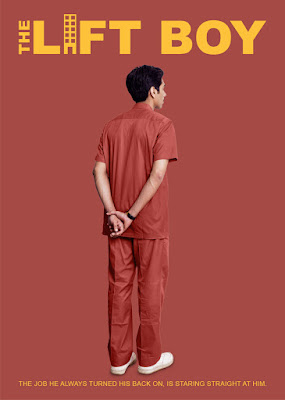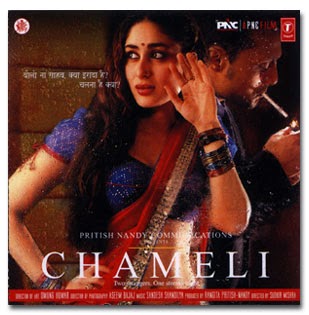REVIEW: THE LIFT BOY
Director: Jonathan Augustin
Rating: 3/5 ***
The real coming-of-age movie that's come from the essentials of India. The movie stands stuck between being a meaningful movie of hope and some bad dialogue with occasional overacting. Essentially a movie to find compassion.
The STORYLINE starts slowly showing Krishna Tawade (Kale) getting annoyed with his lazy loitering son. Followed by an extremely over-the-top heart-attack scene, Krishna Tawade is made to stay in bed to recover. The son, Raju Tawade (Khan) is watching a movie when he hears the news and runs to meet his father. Here, the mother (Neha Bam) insists that Raju fills in for his father while he recovers.
The judgemental Raju relives his lies and embarrassment of his father working as a liftman, which is further aggravated by the characters using the lift and treating Raju as a secondary human. Raju then meets his short-term employer (also his father's full-term employer) - Maureen D'Souza (Masood) who expects subtly hints at Raju learning his place and way in the world.
His diction and language aid him in uplifting his image amongst his employers and the users of the lift - particularly a girl named Princess (Shah). Overtime, encouraged by the possibility of lust and the time to read, Raju begins to enjoy his temporary job and develops a comfortable relationship with Maureen D'Souza.
As Raju 'fills his father's shoes', Raju learns that Maureen is a widow who paints and enjoys Raju's company in her big apartment. The father (Kale) recovers and returns to his house and hopes to start working again soon. Raju convinces his father that he needs to rest some more and they have a heartfelt conversation about careers and life goals.
As Raju gets comfortable, he returns to his older routines of drinking with his friend, Shawn (Damian D'Souza) - particularly after work. Drunk, Raju returns home and finds his disappointed father telling him the story of how Maureen has been helping him acquire education and that he cannot disregard the debt the father owes the woman. However, the father returns to his job in a poetic moment as the son returning to his loitering and lazy ways.
 The father confides in Maureen, who insists that Raju comes back as the lift operator and the father rest. The most humour of the movie comes when the hungover Raju wakes up to find his father relaxing at home and no one operating the lift and hurries back to the job. Maureen after a stern scolding and an entire day of work; makes a plan to help Raju with his studies to succeed at his exam, which he has not been able to crack four times.
The father confides in Maureen, who insists that Raju comes back as the lift operator and the father rest. The most humour of the movie comes when the hungover Raju wakes up to find his father relaxing at home and no one operating the lift and hurries back to the job. Maureen after a stern scolding and an entire day of work; makes a plan to help Raju with his studies to succeed at his exam, which he has not been able to crack four times.
Finally, the father returns to work in the lift full time and Raju is tutored by Maureen throughout the day. As the exam date approaches, Raju's friend Shawn offers him money to bribe a college professor and pass irrespective of his efforts and studies. With a turn-of-heart, Raju rejects cheating and attempts the exam himself and is confident that he will pass. Despite his efforts and good exam, Raju is given some tragic news. The bittersweet ending is perhaps the most important philosophical attempt throughout the movie.
The PERFORMANCES are fluctuating and seem incohesive, despite individual performances that lift the watchability of the rest of the movie.
Moin Khan as Raju Tawade is natural and lively, even in moments where it may not have been required. Khan's portrayal takes the viewer on a slow journey that delves deep into his personal world. The story revolves around him and Khan's spirit helps keep the movie alive. Khan's ease of dialogue delivery and language help him immensely, but also make him distant and unrelatable. Khan remains easy to watch and likeable, despite his covered up character flaws.
 Nyla Masood plays Maureen D'Souza and is sure of every expression and move she makes. Masood becomes the fairy godmother in a story of upliftment, while still maintaining her space. Masood's ability to look down at the camera is juxtaposed with her character's all-knowing, motherly persona. Perhaps the finest actor in this movie, Masood easily draws the attention of the viewer and paints a scene to be looked at from afar.
Nyla Masood plays Maureen D'Souza and is sure of every expression and move she makes. Masood becomes the fairy godmother in a story of upliftment, while still maintaining her space. Masood's ability to look down at the camera is juxtaposed with her character's all-knowing, motherly persona. Perhaps the finest actor in this movie, Masood easily draws the attention of the viewer and paints a scene to be looked at from afar.
Saagar Kale as Krishna Tawade, the father, is likeable for a minute and then unlikeable the next. His wobbly portrayal is unsure and oftentimes over-the-top. His worst moment comes in the first half of the movie as he portrays a heart-attack followed immediately by an equally crass hospital scene. However, as the movie progresses, Kale becomes comfortable and eases into the gentle film, appearing more at ease and showcasing his quirks.
Damian D'Souza as Shawn Lobo is the false hero and crass to a point of misjudged humour. However, D'Souza plays his part with ease and is easily unlikeable, since he portrays the only tangible antagonist. Hand gestures are used as crutches but only add to the crassness of the character.
Neha Bam as Laxmi Tawade, the mother, is easy-on-the-eye but has the most dramatic moments and the remaining secondary characters are enjoyable or bring the humour to this otherwise slow and dry movie.
The DIALOGUE is perhaps what weighs this otherwise decent film down. There are alliterations and unjustified floral language used throughout the movie. The movie's philosophy works through its actors and not through the writing. However, the most complex ideas about desires and career satisfaction are explained with ease.
The COSTUMES are another eye-sore and make the viewer cringe. The otherwise artistic movie could have worked well had the costumes remained more rooted in the beautiful colour palette of the film. The only costume that works well is the one worn by the lift-boy Raju as Khan.
***
As a whole, the movie is philosophically thought out with no unresolved ends. It works with some beautiful direction and shots, particularly painting a pretty picture. However, it neither makes the viewer uncomfortable nor relaxed. The movie leaves no loose ends and resolves every small storyline, but continues to have an unexplained obsession with death and dead bodies. The slow and sometimes stretched out movie could use some more pace with realistic dialogue. This movie serves its purpose of learning compassion and explaining the philosophy of empathy.








Comments
Post a Comment